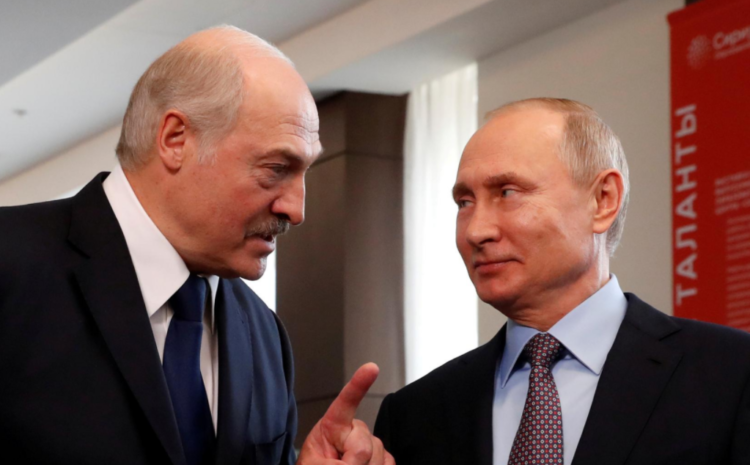
FILE PHOTO: Belarus President Alexander Lukashenko and Russian President Vladimir Putin meet at the Sirius Educational Center in the Black sea resort of Sochi, Russia February 15, 2019. Sergei Chirikov/Pool via REUTERS
MOSCOW/MINSK (Reuters) – Russian President Vladimir Putin said on Thursday the Kremlin had set up a “reserve police force” to support Belarusian leader Alexander Lukashenko, although it would not be deployed unless unrest there got out of control, Interfax news agency reported.
The remarks were the strongest signal the Kremlin has given yet that it is prepared to use force if needed in Belarus, its closest ally among former Soviet states. The comments triggered a response from Belarus’s NATO-member neighbour Poland, which demanded Moscow jettison any such plans to intervene.
“We have of course certain obligations towards Belarus, and the question Lukashenko raised was whether we would provide the necessary help,” Putin said.
“I told him Russia would fulfil all its obligations. Alexander Grigorivich (Lukashenko) asked me to create a reserve police force and I have done that. But we agreed this would not be used unless the situation got out of control.”
Polish Prime Minister Mateusz Morawiecki responded swiftly. Poland “urges Russia to immediately withdraw from plans of a military intervention in Belarus, under false excuse of ‘restoring control’ – a hostile act, in breach of international law and human rights of Belarusian people, who should be free to decide their own fate”, Morawiecki tweeted in English.
Poland also summoned the Belarusian ambassador to clarify what Warsaw called false accusations that it had designs on Belarusian territory.
Belarus has been was plunged into turmoil following an Aug. 9 election, which the opposition says was rigged to extend Lukashenko’s 26-year rule.
Security forces have beaten protesters in the street and arrested thousands in a bid to stamp out mass demonstrations and strikes. Lukashenko denies electoral fraud.
Belarus has the closest political, economic and cultural ties with Moscow of any former Soviet state, and its fortified frontiers with NATO members are crucial to Russia’s defence strategy.
Moscow and Minsk have even proclaimed a “union state”, complete with a Soviet-style red flag. But Lukashenko has had a difficult personal relationship with Putin and is sometimes viewed as a truculent and erratic ally in Moscow.
Nevertheless, Russia has so far taken clear steps to help shore up the Minsk authorities, such as sending journalists to staff state TV after workers quit in protest against what they described as orders to broadcast propaganda.
The West has acted cautiously, wary of provoking a Russian military response as took place in Ukraine in 2014.
In Berlin, EU foreign ministers discussed possible sanctions against a short list of up to 20 Belarusians blamed for electoral fraud or the abuse of protesters.
Writing by Angus MacSwan and Peter Graff; Editing by Mark Heinrich and Nick Macfie
